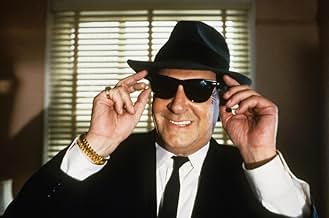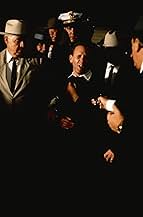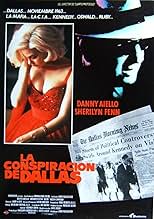Jack Ruby, ein stämmiger Mensch mit einer Mafia-Vergangenheit, wird Manager eines Strippers, mit dem er Präsident Kennedy ein Ultimatum stellt.Jack Ruby, ein stämmiger Mensch mit einer Mafia-Vergangenheit, wird Manager eines Strippers, mit dem er Präsident Kennedy ein Ultimatum stellt.Jack Ruby, ein stämmiger Mensch mit einer Mafia-Vergangenheit, wird Manager eines Strippers, mit dem er Präsident Kennedy ein Ultimatum stellt.
- Telephone Trixie
- (as Jane Hamilton)
- Proby
- (as Richard Sarafian)
Empfohlene Bewertungen
The one problem this movie seems to have is that it sits uncomfortably between mainstream cinema and art-house material. This becomes most apparent in the bombastic, completely unsuitable musical score which wants to make some kind of Godfather out of Ruby. But for the rest, this movie is well worth some time of the viewers attention.
It opens with a frontal shot of Ruby's face. He starts talking: You're sitting somewhere in a motel room, alone and miserable, and the telephone starts ringing". This introduction of a strip act in his club pretty accurately describes Ruby's circumstances. He is a kind of a displaced person who does not seem to belong anywhere, waiting for a call. His activities seem pretty incoherent, his grasp of what is happening around him uncertain. He is proud to be a member of the show business industry, where dreams come true.
Had this movie been less mainstream, I imagine that many scenes concerning the events before the assassination of the President would have had a more dreamlike atmosphere. I would like to believe that a lot of what is going on in the movie is going on uniquely in Ruby's head, the head of a lonely man who is about to loose his sanity and strives to gain a certain presence, a certain stature. The script accommodates such a viewpoint which probably comes closest to Ruby's motives for shooting the man who shot the President.
The acting is mostly very good. Danny Aiello's and Sherilyn Fenn's performances were brilliant, the good chemistry between them makes the relationship between Ruby and his dream woman" special and heartwarming. It also defines Ruby as someone who cares, probably another motive for his action. I am a big fan of Marc Lawrence who is absolutely terrific as the head mobster. He does not speak more than four or five sentences and yet his presence is awesome. The assassination of the President is reenacted with subtlety and tact much better than in Stone's JFK. I found the casual way in which the real locations in Dallas were introduced absolutely stunning. The editing between TV stock material and specially filmed details is masterful.
The best character in this was Maxwell played by Arliss Howard. The scenes and dailogue were both funny and seriously violent that if you would or someone you know would want to rent this movie, you couldn't help but chuckle, or maybe you would take it seriously. All in all, it's still a good movie about the J.F.K. Assassination and the life and times of Jack Ruby.
Don't rent this if you're in the mood for a really serious drama. What I liked about it was that it was comical, a drama, good, bad, and ridiculous in it's own way. And I've always liked movies that are like this one. But don't take my word for it. See it for yourself. :)
Ruby was really no less ridiculous than Stone's JFK, nor less laugh-inducing. With both movies, as to how the amount of patently ridiculous conclusions ended up in the screenplays it always helps me to remember the axiom of many a conspiracy theorist, in that 'absence of evidence is not evidence of absence.' Or, put another way, just because there's no proof something didn't happen doesn't mean it didn't happen.
At least with the movie Ruby, the scope of the story is appreciably smaller than that of Stone's JFK. I suppose by necessity any movie concerning Jack Ruby would be, since Ruby was a fringe player.
Anyway, onto the plot. In a nutshell...Jack Ruby is a nightclub owner in Dallas, Texas in the early 1960's. Originally hailed from Chicago, had a life of low-level crime in the Windy City in the 1930's. Small-time stuff. Doubtless had some accomplices back then who were affiliated with organized crime associates along the lines of street level soldiers in the Mob. So far, that much is verifiably true. From there, Ruby the movie goes on to infer that somehow Jack Ruby is also simultaneously an informant for the Dallas Police Department as well as an informant on organized crime for the Federal Bureau of Investigation in a civilian undercover capacity. In addition, Ruby has also been entrusted to break out a high-level Mafia don out of a Cuban prison. Also, Ruby has been tapped by a Central Intelligence Agency agent to assassinate Fidel Castro with a rifle. Along with all this, apparently Jack Ruby was also on a familiar enough basis with the leading Mafia figures of the country to both dine and socialize with them on an infrequent basis.
I could keep going on re: itemizing the outlandish claims the movie Ruby makes regarding the activities and involvements of Jack Ruby. Rather than bother doing so, I'll just start asking questions about what I've already listed.
If Ruby was so connected with so many important people, why does he keep whining throughout the movie about tax problems he has concerning his nightclub? Shouldn't he have been able via his connections to have had those problems taken care of? Unless, of course, he wasn't nearly as connected with ANY of the important people the movie claims he was.
Why could the CIA entrust the assassination of Fidel Castro to a nightclub-owning, street-level hustler from Dallas, Texas? Conversely, if Ruby were as important in mafia circles as the movie claims he was, why would the CIA entrust the assassination of Fidel Castro to such a person as that?
Would President Kennedy have had so much difficulty getting laid that he would have found it necessary to fly to Las Vegas to have a tryst with a stripper procured for him by the Mafia via Jack Ruby? I know there are shades of Judith Campbell Exner in there, but it wasn't as if JFK was attending an Appalachia-style conference in order to hook up with Exner.
Does David Ferrie strike anybody as the kind of individual with whom one would confide a plot to murder the president to? Or as the kind of individual who would be on a first-name basis with leading organized crime figures?
Wouldn't one think that a policeman guarding the entrance of the Texas School Book Depository in advance of the presidential motorcade arriving (a circumstance that, like so many others in the movie, never happened) would have remembered being told by Lee Harvey Oswald that it was okay to let an unidentified man into the TSBD because he was there to watch the motorcade with Oswald?
The above are just a few of the many, many questions one asks oneself while watching the movie. Just general inquiries that question the logic and rationality of the inferences Ruby the movie makes. I suppose if one is predisposed to believe President Kennedy was murdered by a conspiracy then it is fairly easy to buy into what Ruby the movie is trying to sell. Myself, I can't help but laugh at the absurdity of it all, hence the 8 out of 10 stars: honestly, I look at Ruby (1992) as a comedy.
The kicker is that in the end according to Ruby the movie, Jack Ruby ends up deciding to shoot Oswald entirely of his own volition anyway. Not because the Mafia ordered Ruby to do so as a means of silencing Oswald, as so many other theories suggest. Nope, in Ruby (1992), Jack Ruby shoots Oswald because in doing so he will "blow the whole conspiracy wide open". As to exactly how shooting Oswald was supposed to accomplish this the movie doesn't explain. Nor does the movie explain why, if it wasn't a murder of opportunity re: Ruby being by happenstance physically proximate to Oswald during the basement parking garage transfer but was something Ruby planned, Ruby left his beloved dog in his car when he went to shoot Oswald. Nor does the movie chronicle how Ruby stalked Oswald at the police station throughout the 48 hours between Kennedy's shooting and Oswald being shot. The movie DOES depict Ruby as somehow being able to view Dealey Plaza and the assassination from his vantage point at the Dallas Morning News building, even though in reality that building was several blocks away and didn't have a view of Dealey Plaza.
Sherilyn Fenn plays a character named 'Candy Cane' which is a composite of real-life Carousel Club stripper Candy Barr along with JFK mistress Judith Campbell Exner and self-proclaimed JFK assassination witness Beverly Oliver, a crank who emerged in 1970 claiming at the tender age of 17 to have been standing across the street from the Grassy Knoll when Kennedy was shot and photographed the whole thing using a type of camera that didn't exist in 1963. I mean, that the co-lead character in the movie is somebody who not only didn't exist but has composite elements of a known fabricator and fantasist tells one all one needs to know about credibility and Ruby (1992).
The real question is how was Jack Ruby able to walk right up to the most heavily guarded man in America, guarded as he was by Secret Service, FBI, CIA, Texas State Troopers, and Dallas Police, and shoot him at point blank range. That alone should tell you that Lee Harvey Oswald did not act alone.
The government would tell you that Ruby acted alone, for reasons of grief and rage, etc, but they don't want you to know the truth. They don't think we could handle the truth. They don't want us to know that JFK and his father made a deal with Sam Giancana to get elected and, once elected, the Kennedys reneged on their end of the deal.
By the way, did you know that Lee Harvey Oswald was raised by his uncle in New Orleans, who was a bookie, and did you know that in 1963 all bookmakers worked for the mob? Why would the New Orleans District Attorney (Garrison) get involved in a crime that took place in Dallas? It is all related.
Did you know that several weeks after the JFK assassination the Texas State Attorney General held a press conference and announced that Oswald worked for the CIA? Did you know that Oswald attended Naval Intelligence School, and shortly thereafter he went to Russia, officially as a US dissenter, but more likely as a spy?
Wusstest du schon
- WissenswertesOn the morning of November 24, 1963, while being transferred from a jail cell to an interrogation office, Lee Harvey Oswald was shot by Jack Ruby, a Dallas nightclub owner, allegedly acting out of rage and anguish over the death of the president. Ruby was tried and found guilty of murder (March 14, 1964) and was sentenced to death. In October 1966 a Texas appeals court reversed the conviction, but, before a new trial could be held, Ruby died of a blood clot, complicated by cancer (Jan. 3, 1967).
- PatzerA title card tells us it's 1962. A few scenes later, Ruby watches Joe Valachi on TV testifying about the Mafia before Senator John L. McClellan's Permanent Subcommittee on Investigations. The hearings took place in September, 1963.
- Zitate
Jack Ruby: Where you from?
Sheryl Ann DuJean: [doesn't answer]
Jack Ruby: You come in the Lubbock bus?
Sheryl Ann DuJean: I ain't from nowhere.
Jack Ruby: I've been there. What's it called?
Sheryl Ann DuJean: Rising Star, Texas.
Jack Ruby: I'm from Chicago, myself. Where you headed?
Sheryl Ann DuJean: Out of Rising Star, Texas.
- Alternative VersionenA version of the film aired on the U.S A&E network in the early 2000s removed around 20 minutes of footage including the entire Cuban sequence (and references to it later in the film).
- SoundtracksBlues in the Night
Written by Johnny Mercer and Harold Arlen
Performed by Amy Weston and Sherilyn Fenn
Produced by Barry Goldberg
Top-Auswahl
- How long is Ruby?Powered by Alexa
Details
Box Office
- Budget
- 9.000.000 $ (geschätzt)
- Bruttoertrag in den USA und Kanada
- 919.286 $
- Eröffnungswochenende in den USA und in Kanada
- 614.327 $
- 29. März 1992
- Weltweiter Bruttoertrag
- 919.286 $
- Laufzeit1 Stunde 50 Minuten
- Farbe
- Seitenverhältnis
- 1.85 : 1
Zu dieser Seite beitragen

































